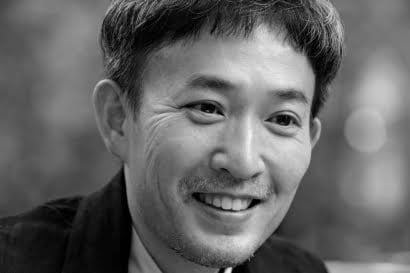
Masatsugu Ono
- Japan
- Zu Gast beim ilb: 2015
Masatsugu Ono was born in 1970 in Japan. He did graduate work at Tokyo University’s College of Arts and Sciences before getting his PhD in literature from the University of Vincennes in Saint-Denis in France. In addition to working as a translator of Francophone literature (Édouard Glissant, Marie Ndiaye and others) and professor at Meiji Gakuin University, Ono also writes.
While other Japanese authors such as Haruki Murakami write successfully about the country in a globalized context, Ono is more interested in pre-modern Japan, which survives in rural areas in the form of villages populated almost exclusively with the elderly. The author has said he feels at ease writing about these people with his own special humor, given the aging of society. In 2001, his literary debut »Mizu ni umoreru haka« (tr: The Water-covered Grave) won the Asahi award for new writers. In his novel »Nigiyakana wan ni seowareta fune« (2002, tr: Boat on a Choppy Bay), which won the Mishima Yukio prize, Ono once again proved to be a master of a language that combines entirely dissimilar cultures. In that book, he uses it to tell the story of a settlement on a peninsula that faced a decision during World War II that divides the community right up to the present day. Following additional fiction such as »Mori no hazure de« (2006, tr: At the Edge of the Forest) and »Maikurobasu« (2008, Microbus), Ono published the novel »Shishiwatari-bana« (tr: The Lion’s Tread). It tells of the mysterious events of one summer in the life of orphan Takeru, who has been sent back to the village where his mother was born. There, he makes the acquaintance of a small being, who could be either a young boy or an old man, and who calls himself Bunji. Mitsuko, the old man with whom Takeru lives, tells him the story of a young boy, many, many years ago, who suddenly disappeared, as if the gods or demons had abducted him. But a fisherman says he saw the child at the far end of a spit of land the locals call the »lion’s tread.« Ono paints a sensitive and animated portrait of a young man dealing with the loss of his mother and a village, in which anything can happen without it seeming peculiar. In 2014, the author contributed the short story »The Man Who Turned Into a Buoy« to the fourth issue of »Monkey Business,« a magazine of new Japanese literature. That same year, his collection »Kyūnen-mae no inori« (tr: A Prayer Nine Years Ago) won the prestigious Akutagawa prize, for which Ono had previously been nominated three times.
Mizu ni Umoreru Haka
Japan, 2001
Nigiyakana wan ni seowareta fune
Asahi Shimbun Publications
Tokio, 2002
Shishiwatari-bana
Kodansha
Tokio, 2013
The Man Who Turned Into a Buoy
[In: Monkey Business 4]
The Nippon Foundation
Tokio, 2014
Kyūnen-mae no inori
Kodansha
Tokio, 2015
